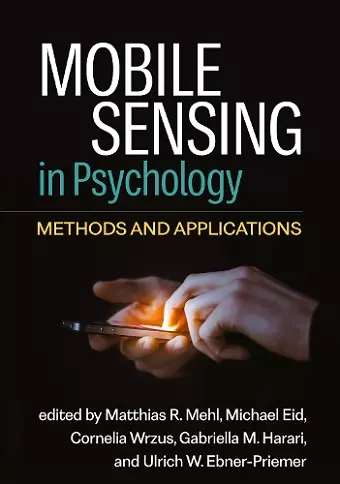Mobile Sensing in Psychology
Methods and Applications
Ulrich W Ebner-Priemer editor Michael Eid editor Matthias R Mehl editor Cornelia Wrzus editor Gabriella M Harari editor
Format:Hardback
Publisher:Guilford Publications
Published:1st Jan '24
Currently unavailable, and unfortunately no date known when it will be back

How can large-scale, real-time, and real-world data on people’s behaviors, interactions, and environments improve psychological measurement, or lead to customized psychological interventions? Written expressly for social and behavioral scientists, this cutting-edge handbook describes the key concepts and tools of mobile sensing and explains how to plan and conduct a mobile sensing study. Renowned experts address the whats, whys, and how-tos of collecting "big data" using smartphones and other wearables, and explore which research questions can best be addressed with these tools. Modern statistical methods for analyzing mobile sensing data are described--for example, dynamic structural equation modeling, network modeling, and machine learning, including deep neural networks. The book includes best-practice research examples of applications in clinical psychology, aging, neuroscience, health, emotions, relationships, personality, the workplace, and other areas. Key methodological challenges and ethical/privacy issues are highlighted throughout.
"Everyone who is engaged in or considering work in mobile sensing surely will benefit from a careful review of this book. The volume provides thorough discussions of privacy, reproducibility, the conduct of research, and ethics. Chapters richly describe passive sensing modalities, analytic methods, and applications, with an emphasis on psychological science. Valuable features include considerations for defining summary variables, reviews of mobile sensing devices and apps, instructions for preprocessing data, and examples to illustrate points. Importantly, the strengths and limitations of mobile sensing research are highlighted."--Arthur A. Stone, PhD, Department of Psychology and Director, Dornsife Center for Self-Report Science, University of Southern California
"Mobile sensing is set to transform the field of psychology. This volume, with its readable and practical chapters on every important element of mobile sensing research, is an essential companion for anyone doing work in this area. Broad in scope and authoritative in content, this is the one book you need, whether you are a graduate student just starting your first mobile sensing study or an experienced researcher seeking to improve your designs, methods, and analyses."--Samuel D. Gosling, PhD, Department of Psychology, The University of Texas at Austin
"With contributions from leading scholars and practitioners from around the world, the book covers a wide range of topics, including how to collect mobile sensing data, how to analyze the data, and applications in specific fields, such as aging, close relationships, emotion detection, and cognitive assessment. This comprehensive, single-volume source is a 'must' for those seeking to explore the vast potential of mobile sensing."--Niall Bolger, PhD, Department of Psychology, Columbia University
"This wide-ranging volume from well-respected editors and contributors provides an impressive 'one-stop shop' for researchers interested in mobile sensing research. The book offers primers on the background and key concepts of mobile sensing, data acquisition and analysis, and applications in specific domains. I have no doubt that this book will serve as a tremendous fount of guidance and inspiration for the next generation of mobile sensing researchers."--Joshua Smyth, PhD, Ohio Eminent Scholar in Health Psychology, The Ohio State University-
ISBN: 9781462553105
Dimensions: unknown
Weight: 1540g
802 pages